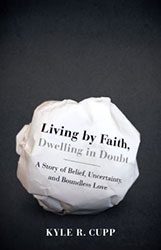 In his new book, Living by Faith, Dwelling in Doubt, Kyle Cupp presents a personal journey into the postmodern world. Like most persons under fifty – and many of us over 50 – his life has always involved dialogue with multiple spiritual pathways. While he has a religious home in the Roman Catholic Church, he recognizes the relativity of his specific denominational faith tradition, of Christianity, and all spiritual points of view. Faith is not having all the answers, but experiencing a lively, dialogical relationship with the Holy: “Too see with faith is not to see the whole but to believe that something of the whole is shown in the fragments we can see.” (11)
In his new book, Living by Faith, Dwelling in Doubt, Kyle Cupp presents a personal journey into the postmodern world. Like most persons under fifty – and many of us over 50 – his life has always involved dialogue with multiple spiritual pathways. While he has a religious home in the Roman Catholic Church, he recognizes the relativity of his specific denominational faith tradition, of Christianity, and all spiritual points of view. Faith is not having all the answers, but experiencing a lively, dialogical relationship with the Holy: “Too see with faith is not to see the whole but to believe that something of the whole is shown in the fragments we can see.” (11)
Many people are frightened by the realities of pluralism in the political and religious realms of life. Implicitly recognizing that their cause is lost, certain religious leaders double down their efforts to demonize other religious traditions (especially Islam) as well as the gay and lesbian community. They imply that such persons are beyond God’s revealing witness and love. Though they claim to hate only the sin, their vitriolic comments suggest that they also hate the sinner. In politics, a certain segment of the USA congress and citizenry are doing their best to deny the changing face of the USA, revealed in the mixed religious heritage of the President of the United States, who is damned on the one hand as a non-citizen and on the other as a Muslim, while also being vilified for his association with his prophetic Christian pastor. Challenges to voting rights and ending campaign contribution restrictions are consciously aimed at keeping the emerging American majority from achieving representational political power. Despite their destructive and delaying efforts, resembling those of a losing sports team begins picking fights in the final minutes of the game, their cause will eventually lost. The demographic – and dare we say, moral – arc of history is against them.
Pluralism can be threatening. As Cupp astutely notes, “the plurality of stories challenges our faith.” (12) Cupp also recognizes that the early Christian movement was immersed in a creative response to pluralism, reflected in the choice of four unique and contrasting stories of Jesus, not to mention those gospels not admitted into the canon but influential on Christian theology nevertheless, and the multicultural ministry of Paul, which transformed Christianity from an ethnic Jewish faith to a global religious movement.
Cupp aptly notes that our visions of God shape our response to pluralism and postmodernism. “The way we imagine God sets the road we will take.” (23) In a number of my books, I have asserted that a well-articulated theology joins vision, promise, and practice – it gives us a way of interpreting reality, affirms that we can experience our deepest beliefs, and provides spiritual practices to enable us to experience the God or Ultimate we affirm.[1] Our vision of God can change everything in terms of our relationship with persons of other faiths and political persuasions.
First of all, as Cupp implicitly suggests, we must navigate between the kataphatic and apophatic poles of religious experience. The kataphatic or imagistic way asserts that God is revealed throughout creation and that we can describe God’s nature in meaningful, truthful, and life-changing ways. In contrast, the apophatic or imageless way claims that all images of God fail to express God’s fullness. We dwell in a “cloud of unknowing” in which we can glimpse shadows but the real thing always eludes us. Together the kataphatic and apophatic give birth to healthy theology for a pluralistic age, which affirms that:
- there may be a universal reality, but our experience is always partial and prone to error
- we can experience and talk about God, but these words are, as Zen Buddhist wisdom notes, fingers pointing to the moon and not the moon itself
- encounters with the Holy transform our lives and shape our rituals, theologies, and ethical stances, but they are always subject to transformation in light of new encounters with the divine
- faith is always on the move, growing in its apprehension of the Holy, but our apprehensions reveal our experiential limitations; God is always more than we can imagine
Second, we need to take Jesus’ own life as a model: as Luke’s Gospel asserts, Jesus grew in wisdom and stature and favor with God and humankind. Jesus grew! A healthy faith is always incomplete and growing at the same time. More light is always being revealed in our encounters with God and the gifts of other faith. In a pluralistic age, we look for signs of God in the varieties of religious experiences and the affirmations of non-Christians as well.
Third, encounters with other faith traditions as well as agnostics, atheists, and peoples of other races and cultures, provides the opportunity for growth as well as challenge. We can hold fast to our understanding of Christ and our tradition’s vision of faith and practice and also embrace truths from other spiritual paths. Faithful persons can practice multiple or hybrid spiritualities: active in our church, we can also go to a Zen monastery, practice Hindu yoga, or learn reiki healing touch. Faith is an adventure of the spirit, not a stopping point, and our encounters with other traditions can transform and deepen our relationship with our faith, with Christ, and the practices of our church.
Cupp’s faith is a living faith – a faith fully postmodern, not putting on a show of false orthodoxy, but like the Psalmist bringing everything to God, including anger, doubt, love, disappointment, and hope. A fluid, lively, and adventurous God, the God experienced by postmodern people of all kinds, invites us to live our faith in all the seasons of life, knowing that the Great Adventure of God is always with us, more than we can imagine, but faithful through all the changes of life.
[1] See Bruce Epperly, Emerging Process: Adventurous Theology for a Missional Church (Parson’s Porch, 2012) and Loosely Christian: Answering God’s Invitation to Creative Faith for Today (Bondfire, 2013)
To read an excerpt from Living by Faith, Dwelling in Doubt, visit the Patheos Book Club here.













